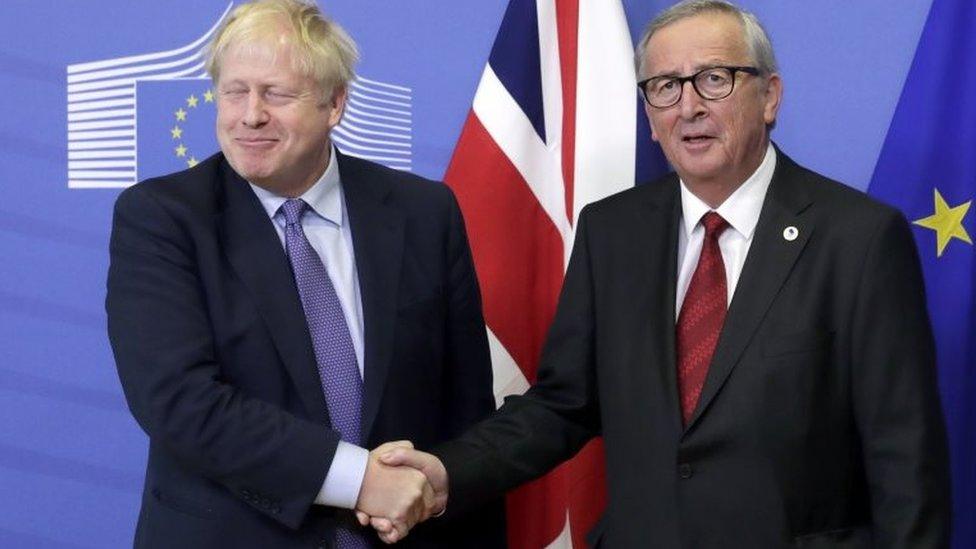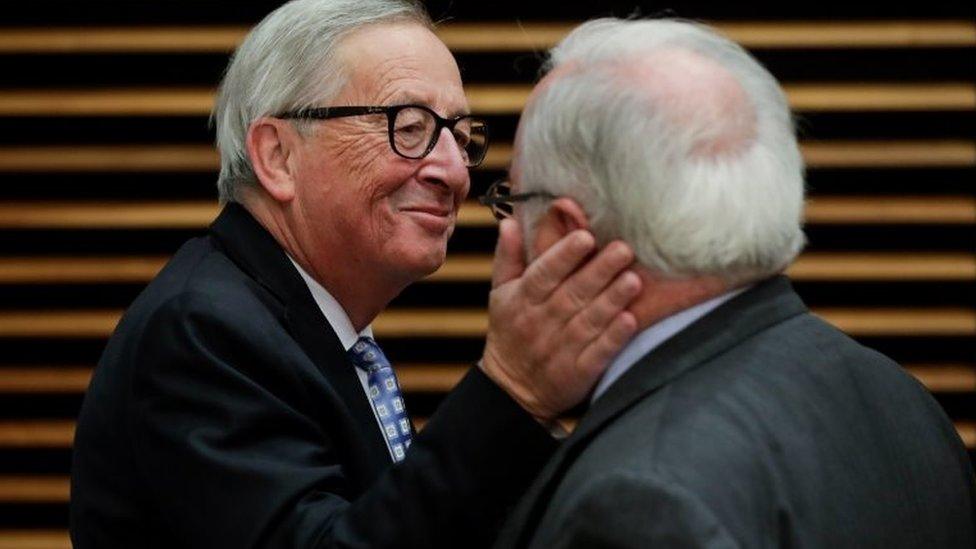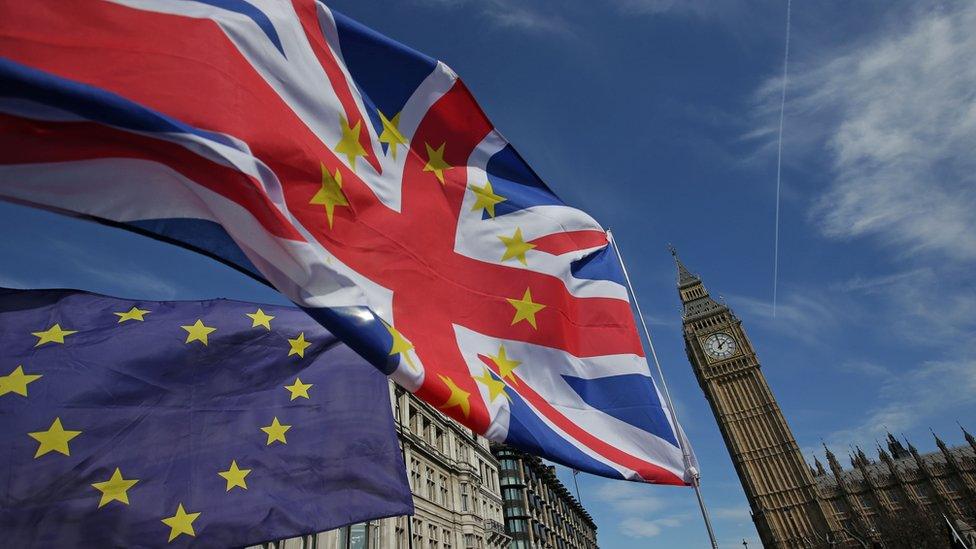Jean-Claude Juncker: 'I've had enough Brexit', outgoing EU chief says
- Published
Jean-Claude Juncker: "Brexit is a too-long story that has to be brought to an end"
Famous for extravagant pronouncements and gestures like kissing EU leaders on the forehead or playfully slapping their face - Jean Claude Juncker was untypically guarded. He clearly didn't want to be seen to be trying to interfere in the general election.
However, when I put some Brexit promises to him being made by the various political parties, engage he did, crushing a number of key party pledges in the process - from an EU perspective, at least.
First off, Mr Juncker told me he thought Brexit would happen by the end of January, as Boris Johnson claims.
"The Brexit process has gone on too long already," he said.
But the outgoing European Commission president very much took issue with the prime minister's assertion that a brand-new comprehensive post-Brexit EU-UK trade deal could then be negotiated in a year or less.
"These things take time," he said. "Just look at the free trade deal the EU negotiated with Canada. That took seven years."
Mr Juncker said he had a feeling that many UK MPs and government ministers believed negotiating trade deals was easy. But, he said, it would take quite some time to disentangle the UK from decades of forging common rules and regulations with the EU and to form a distinct and new relationship.
The Commission are trade experts - they conduct all trade negotiations on behalf of the EU.
But Mr Juncker refused to be drawn on a claim made by Donald Trump that the Brexit divorce deal agreed between the EU and Mr Johnson made trading with the US an impossibility. "Sometimes the US president says this, sometimes he says that," noted Mr Juncker, adding that President Trump's statements didn't always match up.
A UK-US trade deal was a bilateral issue for the two sides, he said. "Trump is unpredictable. He is flexible".
When I pointed out to Mr Juncker that Mr Trump does not like the EU as a strong concept, he retorted, "He's very British!".
Mr Juncker also challenged a promise by the Labour Party to renegotiate the Brexit deal with the EU once again if it won the election. This would be the third divorce deal struck with Brussels, after the efforts of Theresa May and Mr Johnson.
Mr Juncker said he didn't think Labour's pledge was a realistic prospect, although he pointed out it was for the next European Commission chief to decide if there was any flexibility to reopen the Withdrawal Agreement once again.
Strictly speaking, though, the decision whether or not to re-start exit negotiations with the UK would fall primarily to EU national leaders in Berlin, Paris and beyond. The European Commission negotiates Brexit on their behalf.
When I asked what he preferred: for the UK parliament to ratify the current Brexit deal or to approve holding another referendum, Mr Juncker gave the stock EU response that that choice was a domestic one for the UK. But he said he didn't think there would be a second referendum.

Shaking on it - Boris Johnson and Jean-Claude Juncker conclude the Brexit deal
And despite his complaint about the protracted Brexit process, Mr Juncker refused to accept that the EU shared at least some of the blame. In his opinion there was no point pontificating on whether Brexit could have been done and dusted ages ago if the Irish border issue had not been front and centre of divorce talks.
Ireland demanded the post-Brexit status of the border between Northern Ireland and the Republic of Ireland be a key focus at every stage of negotiations, he told me, and the EU did its best to support a member state.
His implication: the EU couldn't and wouldn't have done it any other way.
Binning the backstop?
Mr Juncker appeared to contradict Mr Johnson's claim that he had managed what his predecessor Mrs May failed to do: to get the EU to blink and "bin the backstop".
Instead, the European Commission president said they had found a new way in renegotiations to come up with exactly the same result as the original backstop. In practical terms, if not legally speaking, under Mr Johnson's deal, Northern Ireland will remain part of the EU's customs union after Brexit.
This is the border down the Irish Sea between Northern Ireland and the rest of the UK the prime minister had initially said he would never, ever allow.
One of the reasons UK voters have given for choosing to leave the EU is the concept of "ever closer union" - a fear of European federalism.
'United States of Europe'
President Juncker is often associated with the dream of a "United States of Europe" but he told me that was a wilful misunderstanding in the British media.
"I am not ready for that. The people of Europe are not ready for that. We are who we are. Nations are important," he insisted.

A playful slap for a fellow Commission member in October
A reader of the British press, Mr Juncker said: "They are lying when they call me an archaic, blind, stubborn European federalist. I'm not."
During his five years in office, Jean-Claude Juncker has seen an EU crisis or two: the rise of populist Eurosceptic politicians, the migration crisis and the Greek debt crisis.
But Brexit will arguably leave the deepest scar on the European Union. I asked Mr Juncker if he wasn't tempted to stay and see the Brexit process through till the end.
No, he replied firmly. "I've had Brexit enough in my life."
- Published5 December 2019

- Published28 October 2019
